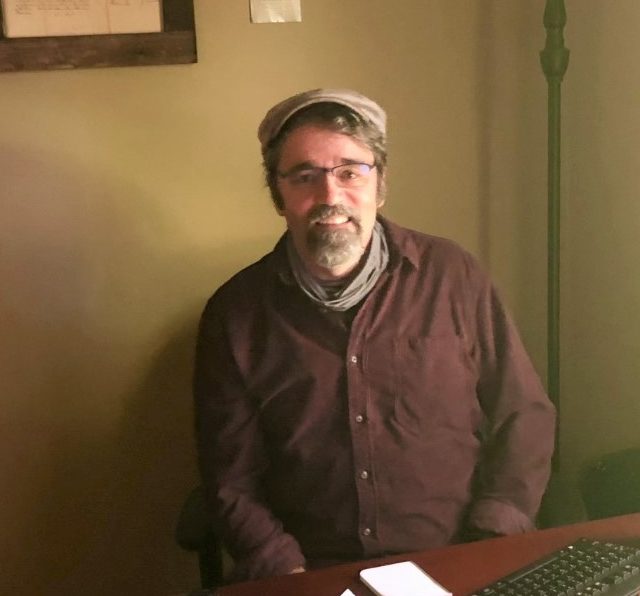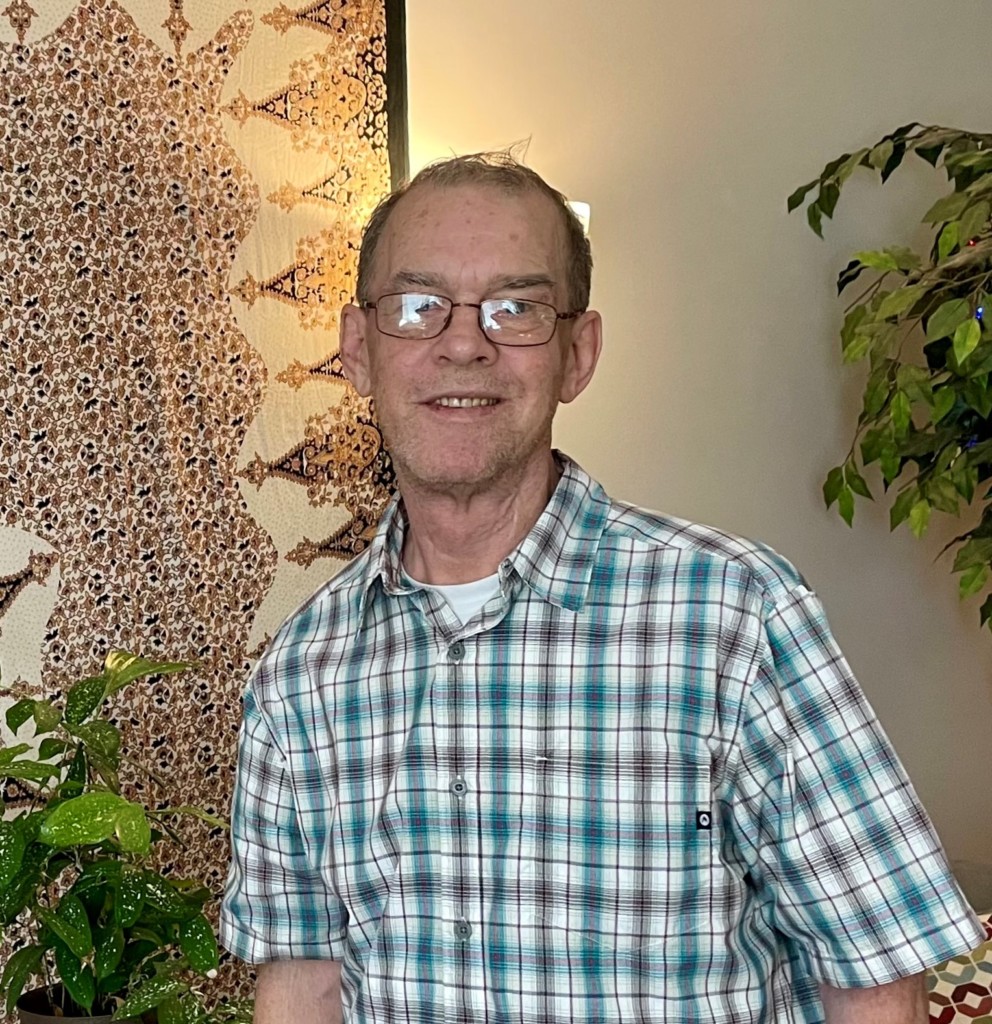The immense success of the RISE Supported Housing, is due in large part to the support services provided by staff to our program participants. Staff have worked alongside each other for several years, and combine their efforts cohesively in order to provide excellent support services to the individuals and families in our supportive housing program. These services, such as the on-call service, personalized counseling, transportation, and medication management, enable people with mental health challenges, physical ailments, and other life challenges to live safely and successfully in the community. As we grow and expand our supportive housing programs into surrounding communities, our goal is to continue to provide a high quality level supportive services.
“Our staff genuinely care about and enjoy helping people.”
Rik Jordan, the RISE Residential Director and former Supported Housing Program Director, is a proponent of the person-centered philosophy central to the supportive services we provide.
 Our staff genuinely care about and enjoy helping people. The person-centered philosophy behind supportive housing gives us the flexibility to meet people where they are at. We are able to shift the focus of the support we provide and tailor the goals to meet needs based on what is going on in the present. This enables people to obtain the support they need to deescalate when in a crisis and manage their circumstances while remaining safe in their home, rather than using emergency and in-patient psychiatric services.
Our staff genuinely care about and enjoy helping people. The person-centered philosophy behind supportive housing gives us the flexibility to meet people where they are at. We are able to shift the focus of the support we provide and tailor the goals to meet needs based on what is going on in the present. This enables people to obtain the support they need to deescalate when in a crisis and manage their circumstances while remaining safe in their home, rather than using emergency and in-patient psychiatric services.
John Shoemaker, the current Supported Housing Program Director, also believes that the person-centered support services he and his staff provide to people are essential in helping them achieve and maintain stability.
One of the great things about supportive housing is how intimately we know the people we work with. This allows us to recognize the subtle signs that someone might be starting to decompensate so we can intervene before the person is in crisis. If the same person was living in the community on their own, they might not have anyone around to notice when they are experiencing stress, and by the time they get help, it is often too late to prevent hospitalization or even homelessness. But, because we get to know the people we work with so well, we can pick up on those signs and intervene. Often all it takes to divert a crisis is a subtle suggestion or offering choices and the consequences between the choices to help someone divert a crisis and regain stability.
“My supportive housing counselor helps me process my thoughts with when I start worrying about things that are out of my control.”
Brian, a supportive housing resident, describes how receiving support services from his counselor enables him to remain stable and maintain his housing.
 Having a supportive housing counselor is important because it gives me someone to process my thoughts with when I am having a bad day or start worrying about things that are out of my control. Mike, my counselor, helps me make light of things, often using humor to help me see things form a different perspective. He also helps me by helping me arrange or provide transportation to my service provider appointments. And he advocates for me with my mental health service providers when needed.
Having a supportive housing counselor is important because it gives me someone to process my thoughts with when I am having a bad day or start worrying about things that are out of my control. Mike, my counselor, helps me make light of things, often using humor to help me see things form a different perspective. He also helps me by helping me arrange or provide transportation to my service provider appointments. And he advocates for me with my mental health service providers when needed.
An important thing that helped my stability is that the supportive housing staff assisted me to find a one-bedroom apartment where I can live alone without the added stress of having a roommate. Also, since I live alone and the landlord allows pets, I was able to get a cat. She is a great companion, she is entertaining, she helps me calm down when I am stressed, and she creates good energy in my home which helps me feel safe.
“Helping people in supportive housing get on with their lives is a very important part of this work.”
Brian’s counselor, Michael LaBelle, who has been a Supported Housing Counselor for over twenty years, believes it is a privilege to work with people in supportive housing. He enjoys working with the individuals in our program and providing the assistance that enables them to live safely, independently, successfully in the community.
 Helping people in supportive housing get on with their lives is a very important part of this work. We assist as needed. Sometimes it is just being an ear allowing the person to talk their way through an issue to find their own solutions. Sometimes it is interjecting humor, which helps break the tension and allows the person in the midst of a struggle take a step back and see things from a different vantage point. Other times is it just being an emotional cheerleader, providing encouragement and affirming the choices they made are good solid choices.
Helping people in supportive housing get on with their lives is a very important part of this work. We assist as needed. Sometimes it is just being an ear allowing the person to talk their way through an issue to find their own solutions. Sometimes it is interjecting humor, which helps break the tension and allows the person in the midst of a struggle take a step back and see things from a different vantage point. Other times is it just being an emotional cheerleader, providing encouragement and affirming the choices they made are good solid choices.
Then there are the hard times during which is it important for us to be there. We provide the support needed to help people manage life’s losses such as the death of a friend or a loved one. Sometimes we have to help people make hard choices between the potentially harmful side effects of powerful psychiatric medications and the consequences of not taking them. Other times it is just being there to help them manage things that are out of everyone’s control, such as what we all went through these past two years with the pandemic.
“Many of the people in supportive housing no longer have any family around to help them, so in a sense, we are their family.”
Amy Perkins and Lehra Inglis have both worked as Supported Housing Counselors for about seven years. They feel that the amazing teamwork between the staff allows them to provide quality supportive services that help individuals remain safely in their home.
 We have each other’s back, are able to bounce ideas off each other to figure out the best way to handle situations. Our program director is very supportive of our work and often offers another perspective we might not have considered. Because of this type of teamwork, we are able to provide informed and compassionate support services to the individuals in supportive housing.
We have each other’s back, are able to bounce ideas off each other to figure out the best way to handle situations. Our program director is very supportive of our work and often offers another perspective we might not have considered. Because of this type of teamwork, we are able to provide informed and compassionate support services to the individuals in supportive housing.
Lehra explains how teamwork enables the staff to be very flexible in the types of support she and her coworkers provide people, in that they only need to be hands on enough to help people achieve their goals to become more independent.
Many of the people in supportive housing no longer have any family around to help them, so in a sense, we are their family. We are there to provide the supports needed to keep them in their homes. Often, just being there to help them figure out how to do things on their own is all that is necessary, giving them a sense of autonomy and dignity. We help them look at things in a different light, to see things from a different point of view, which helps them figure out for themselves what they need to do.
Sometimes this process is challenging, especially when someone is working through an emotional issue. But seeing the growth and differences in someone’s life once they’ve worked things through themselves is very rewarding. This is why supportive housing is so important; for many people having that extra support is all they need to be able to live independently.
“Because of the support I received in supportive housing, I feel that I am finally beginning to live as an independent adult.”
One supportive housing resident that Lehra works with, Amanda, has been in RISE Supported Housing for seven years. She is someone who at first needed lots of guidance, but Amanda worked hard and over time she became more and more independent. She went back to school, started a part-time job, and now she is very independent and only reaches out when she needs a little guidance or to bounce ideas off of someone. Amanda attributes much of her success to the supportive services she received from Lehra and the supported housing staff.
 I appreciate my counselor, Lehra. The support she gives me allows me to live successfully and independently in my apartment. She helped me with managing my symptoms, taking my medications, developing, and keeping a budget, and working on my time management skills. In the past I was very dependent on my parents, but now with Lehra’s assistance, I feel that I am finally beginning to live as an independent adult. She helped me set and reach several goals over the years. Now I am able to manage my medications, my budget, and my mental health symptoms with very little guidance or support. And, as a result, I am less dependent on my parents, and I am able to have an adult relationship with them. However, I know if I become confused, have a crisis, or just need a little help, supportive hosing staff are there to provide the guidance I need to figure things out on my own.
I appreciate my counselor, Lehra. The support she gives me allows me to live successfully and independently in my apartment. She helped me with managing my symptoms, taking my medications, developing, and keeping a budget, and working on my time management skills. In the past I was very dependent on my parents, but now with Lehra’s assistance, I feel that I am finally beginning to live as an independent adult. She helped me set and reach several goals over the years. Now I am able to manage my medications, my budget, and my mental health symptoms with very little guidance or support. And, as a result, I am less dependent on my parents, and I am able to have an adult relationship with them. However, I know if I become confused, have a crisis, or just need a little help, supportive hosing staff are there to provide the guidance I need to figure things out on my own.
“The supportive housing staff are like a safety net to reach out to when needed.”
Another supportive housing resident that Lehra works with, Tim, has been in RISE Supported Housing for five and half years.
 The supportive housing staff are like a safety net to reach out to when needed. For the most part I am able to live independently, managing my mental and physical health while remaining in my own home. However, I know that if I have a problem, or if I start to feel too depressed to take care of myself, I can reach out to my counselor and talk through things to get myself back on track.
The supportive housing staff are like a safety net to reach out to when needed. For the most part I am able to live independently, managing my mental and physical health while remaining in my own home. However, I know that if I have a problem, or if I start to feel too depressed to take care of myself, I can reach out to my counselor and talk through things to get myself back on track.
In the past, my mental health challenges have caused me to end up sleeping on friends’ couches and nearly be homeless. But being in supportive housing gives me the security I need to engage in hobbies and other activities that help keep my mind active and occupied which helps me not ruminate on the things that increase my anxiety and depression. At one point my physical health had started to deteriorate, by with encouragement from my counselor, I sought out and followed the advice of my doctors. I’ve since lost weight, improved my eating habits, and do not have to rely on medications to maintain my physical health.
Amy furthers this conversation by explaining why helping others live independently and seeing them make strides to improve their lives is so rewarding.
The best thing about supportive housing is that the services we provide is so individualized. It is key to know each person and where they are at in their life, and give support based on individual needs. It is very rewarding to help others live independently and make strides towards their goals. That is how the program works – we offer guidance that helps people make their lives better for themselves. It is a great joy to see how much a person’s spirits are lifted when they see what they are able to accomplish on their own.
“Talking things through with my supportive housing counselor reduces the number of times that I need to reach out to formal supports such as my therapist or my psychiatrist.”
One of the supportive housing residents that Amy works with, Elaina, who has been in RISE Supported Housing for three years, strongly believes that the services she receives gives her a sense of security.
 Being in a supportive housing program helps me stay in my home. The staff are lovely and helpful. With my physical health issues, I needed a ground floor apartment which they found for me. Amy, my counselor, is invaluable. She is there to talk through things that are on my mind which is nice because it reduces the number of times that I need to reach out to formal supports such as my therapist or my psychiatrist. Even throughout the horrible pandemic, Amy was there for me when I needed her. Knowing that I have her or the on-call counselor to reach out to, especially when things get really dark, is like having a light at the end of a tunnel when things get tough.
Being in a supportive housing program helps me stay in my home. The staff are lovely and helpful. With my physical health issues, I needed a ground floor apartment which they found for me. Amy, my counselor, is invaluable. She is there to talk through things that are on my mind which is nice because it reduces the number of times that I need to reach out to formal supports such as my therapist or my psychiatrist. Even throughout the horrible pandemic, Amy was there for me when I needed her. Knowing that I have her or the on-call counselor to reach out to, especially when things get really dark, is like having a light at the end of a tunnel when things get tough.
“My parents are elderly and have health issues so, while they are supportive, I needed more support than they can provide.”
Karen, who has been a supportive housing resident for six years, feels very cared about by Amy and the other Supported Housing staff members who reassure her that she is safe and help her to not give into the depression that otherwise might cause her to make choices that prevent her from living on her own.
 I don’t think I would be able to make it by myself. I have some severe physical health conditions which makes my mental health issues worse. My parents are elderly and have health issues so, while they are supportive, I needed more support than they can provide.
I don’t think I would be able to make it by myself. I have some severe physical health conditions which makes my mental health issues worse. My parents are elderly and have health issues so, while they are supportive, I needed more support than they can provide.
I get so depressed because of my chronic health issues but talking to Amy helps me not go down the rabbit hole of depression and into suicidal thoughts. I have a list of things she helped me make that I can do to keep my mind off my worries. So, when I get symptomatic, I use the coping skills on that list, such as thinking about nice things that I can do for others, which helps takes my mind off whatever is bothering me. And when my thoughts get too dark, I know I can call Amy or the supportive housing on-call worker and talk things through. They reminded me to use my coping skills, so I do not obsess about my problems, especially when I want to give up on life because of my health.
The medication I am on for my chronic health issues makes me forgetful. Prior to COVID, Amy took me to my appointments sat in them with me and to help me remember what the doctor told me. Now a mental health worker at my doctor’s office does that and writes his instructions down for me. Later when I get upset or confused, Amy reads these notes to me to help me remember what the doctor told me. This reassures me and helps me not feel like everything is so bleak and useless because of my health issues.
The best thing that Amy did for me was help me get a cat, when my older cat, Felix passed away. I was very upset, but Amy told me about a cat whose owner had passed away and he was going to have to go to the animal shelter. She arranged for me to adopt him and takes me to the vet to get his check up and shots. I named him Boo Bear, and it is a great comforted to have him as a companion.
